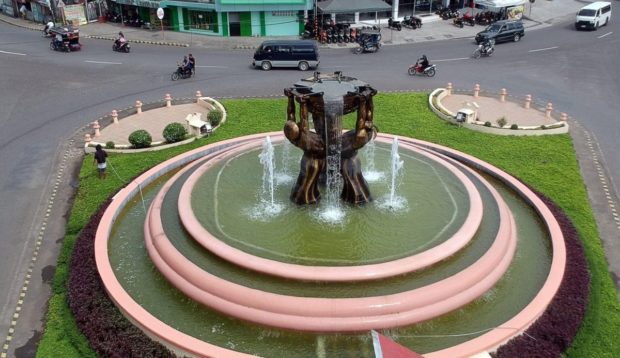WWF names Dipolog ‘most lovable’ PH city in 2022

SYMBOL OF DIVERSITY | In this undated photo, visitors to Dipolog City, the capital of Zamboanga del Norte, are greeted by the Pagsalabuk Circle, a symbol of diversity and peaceful coexistence of its Subanen, Muslim and Christian residents. (Photo courtesy fo the Dipolog City government)
ILIGAN CITY, Lanao del Norte Philippines — Dipolog, the capital city of Zamboanga del Norte province, earned the tag of “most lovable city” in the country this year after gaining popular acclaim from experts and ordinary netizens for its target of reducing local carbon emissions by 75 percent in 2030.
Mayor Darel Dexter Uy received the citation from World Wildlife Fund for Nature (WWF) at an event in Pasig City on Tuesday, during which Dipolog was also formally awarded for winning the One Planet City Challenge (OPCC) 2021-2022.
WWF announced the OPCC winners last June.
Ernie Rojo, Uy’s executive assistant, told the Inquirer on Wednesday that the OPCC was a friendly competition among participating cities on putting out a commitment to reduce carbon emissions as part of the global climate action.
Dipolog, Davao, and Quezon cities, which were the three finalists in the country, qualified to compete for public engagement on social media for the most lovable city tag.
Bold plan
WWF intended the competition to encourage more climate action as cities are key contributors to climate change. According to WWF, an estimated 75 percent of global carbon emissions are from cities, with transport and buildings among the most significant contributors.
“Dipolog City was commended by the international jury of the OPCC Core Team in Sweden for its bold emissions reduction plan, which is aligned with science-based targets needed to keep global warming within 1.5 degree Celsius,” said WWF.
Cities participating in the OPCC were measured for their ambitious climate targets, bold leadership, ability to meet upcoming challenges, and a holistic climate action plan that is well balanced toward their goals.
Dipolog has committed to cutting emissions by 75 percent, based on a 2018 baseline, in 2030, and being carbon neutral by 2050.
A greenhouse gas inventory done in 2020 estimated the city’s total emissions at 1.7 million tons of carbon dioxide, generated mostly by stationary combustion or fuel used by households, establishments, and other facilities.
As part of its climate commitment, the Dipolog local government has shifted to renewable energy for its street lights, saving P500,000 in monthly electricity costs.
The local government also went full blast on forest protection and rehabilitation projects to enhance the local environment’s capacity for absorbing carbon emissions.